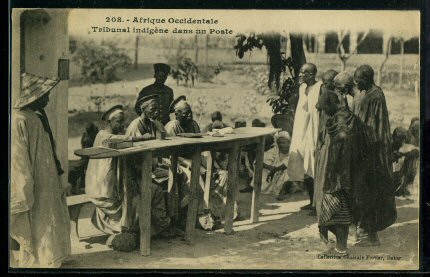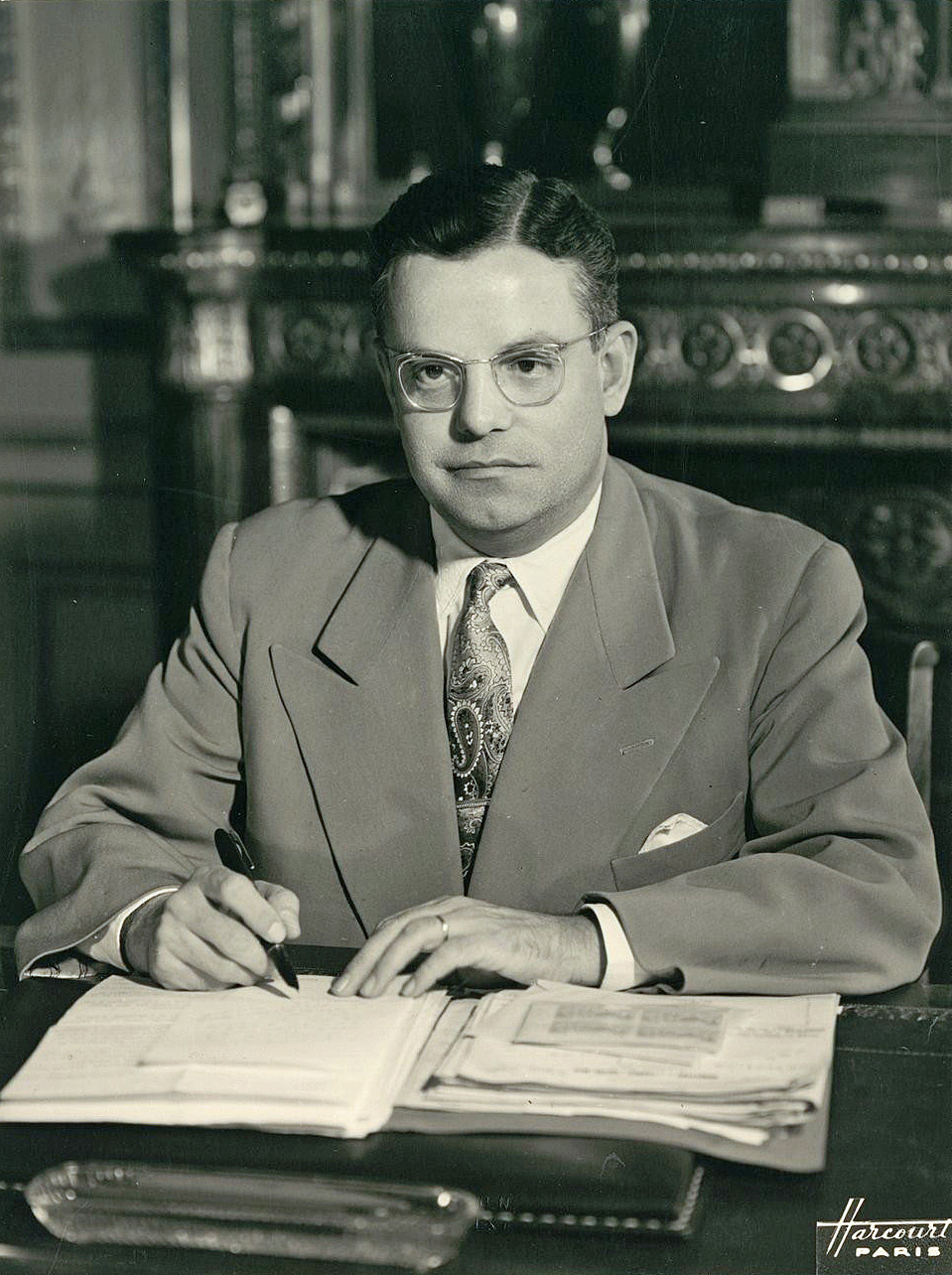|
André-Marie Mbida
Andre-Marie Mbida (1 January 19172 May 1980) was a Cameroonian statesman, a nationalist, the first Cameroonian to be elected Member of Parliament at the French National Assembly, a Prime Minister of Cameroon, the second African-born Prime Minister in Sub-Saharan Africa, the first Head of State of French-speaking autonomous Cameroon from 12 May 1957 to 16 February 1958, and the first political prisoner of independent Cameroon from 29 June 1962 to 29 June 1965. Early life and education Andre-Marie Mbida was born on 1 January 1917 in Edinding (Cameroon) and died 2 May 1980 in Paris (France). He hailed from Nyong and Sanaga region of Cameroon. He was born into the traditional aristocracy as the son of a mixed race Traditional ruler Simon Monbele Ongo Nanga chief of Ngo logou and Edinding who led a rebellion against the German invaders and Ngono Veronique . André Marie MBIDA went to the rural primary school of Efok (Lekié division) and was a brilliant student. He then continued ... [...More Info...] [...Related Items...] OR: [Wikipedia] [Google] [Baidu] |
Beti-Pahuin
The Beti-Pahuin are a Bantu ethnic group located in Center region of Cameroon. Though they separate themselves into several individual clans, they all share a common origin, history and culture. Estimated to be well over 8 million individuals in the early 21st century, they form the largest ethnic group in central Cameroon and its capital city of Yaounde. Their Beti languages are mutually intelligible. Group distinctions The Beti-Pahuin are made up of over 20 individual clans. Altogether, they inhabit a territory of forests and rolling hills that stretches from the Sanaga River in the north to Equatorial Guinea and the northern halves of Gabon to Congo to the south, and from the Atlantic Ocean to the west to the Dja River in the east. Beti The first grouping, called the Beti, consists of the (more precisely Kolo), , Fang (more precisely M'fang), Mbida-Mbane, Mvog-Nyenge, Bran (more precisely Brang or Brong) and Eton (or Iton). The Eton are further subdivided into the Eton ... [...More Info...] [...Related Items...] OR: [Wikipedia] [Google] [Baidu] |
Charles Assalé
Charles Assalé (4 November 1911 in South Province – 10 December 1999 in Yaoundé) was a Cameroonian politician and the founder of the Union of the Peoples of Cameroon in April 10th 1948. He served as the Prime Minister of the Republic of Cameroon from January 1st 1960 to 1961 and the first Prime Minister of the federated state of East Cameroon from 15 May 1961 to 19 June 1965. He fell out of power and was succeeded by Former Prime Minister of Cameroon Cameroon, officially the Republic of Cameroon, is a country in Central Africa. It shares boundaries with Nigeria to the west and north, Chad to the northeast, the Central African Republic to the east, and Equatorial Guinea, Gabon, and the R ..., Vincent de Paul Ahanda. References 1911 births 1999 deaths People of French Equatorial Africa Prime ministers of Cameroon Finance ministers of Cameroon Union of the Peoples of Cameroon politicians People from South Region (Cameroon) {{Cameroon-politician- ... [...More Info...] [...Related Items...] OR: [Wikipedia] [Google] [Baidu] |
National Assembly Of France
The National Assembly (, ) is the lower house of the Bicameralism, bicameral French Parliament under the French Fifth Republic, Fifth Republic, the upper house being the Senate (France), Senate (). The National Assembly's legislators are known as () or deputies. There are 577 , each elected by a single-member Constituencies of the National Assembly of France, constituency (at least one per Departments of France, department) through a two-round system; thus, 289 seats are required for a majority. The List of presidents of the National Assembly of France, president of the National Assembly, currently Yaël Braun-Pivet, presides over the body. The officeholder is usually a member of the largest party represented, assisted by vice presidents from across the represented political spectrum. The National Assembly's term is five years; however, the president of France may dissolve the assembly, thereby calling for early elections, unless it has been dissolved in the preceding twelve m ... [...More Info...] [...Related Items...] OR: [Wikipedia] [Google] [Baidu] |
Indigénat
The Native code () was a diverse and fluctuating set of arbitrary laws and regulations which created in practice an inferior legal status for natives of French colonies from 1881 until 1944–1947. The Native code was introduced by decree, in various forms and degrees of severity, to Algeria and Cochinchina in 1881, New Caledonia and Senegal in 1887, Annam– Tonkin and Polynesia in 1897, Cambodia in 1898, Mayotte and Madagascar in 1901, French West Africa in 1904, French Equatorial Africa in 1910, French Somaliland in 1912, and the Mandates of Togo and Cameroon in 1923 and 1924. Under the term are often grouped other oppressive measures that were applied to the native population of the French empire, such as forced labor, requisitions, capitation (head tax), etc. Introduction in Algeria The Native code () was created first to solve specific problems of administering Algeria during the early-to-mid-19th century. In 1685, the French royal ''Code Noir'' decreed the treatm ... [...More Info...] [...Related Items...] OR: [Wikipedia] [Google] [Baidu] |
Roland Pré
Roland (; ; or ''Rotholandus''; or ''Rolando''; died 15 August 778) was a Franks, Frankish military leader under Charlemagne who became one of the principal figures in the literary cycle known as the Matter of France. The historical Roland was military governor of the Breton March, responsible for defending Francia's frontier against the Bretons. His only historical attestation is in Einhard's ''Vita Karoli Magni'', which notes he was part of the Frankish rearguard killed in retribution by the Basques in Iberia at the Battle of Roncevaux Pass. The story of Roland's death at Roncevaux Pass was embellished in later medieval literature, medieval and Renaissance literature. The first and most famous of these epic treatments was the Old French ''Chanson de Roland'' of the 11th century. Two masterpieces of Italian Renaissance poetry, the ''Orlando Innamorato'' and ''Orlando Furioso'' (by Matteo Maria Boiardo and Ludovico Ariosto, respectively), are even further detached from histo ... [...More Info...] [...Related Items...] OR: [Wikipedia] [Google] [Baidu] |
Louis-Paul Aujoulat
Louis-Paul Aujoulat (28 August 1910 – 1 December 1973) was a French politician and missionary doctor. Following his long and illustrious political career he served as France's representative to the World Health Organization. Early life Aujoulat was born on 28 August 1910 in Saïda, Algeria. He completed his secondary education in Sidi Bel Abbès, where his father taught, before being educated at the Catholic University in Lille (North of France) in 1928 to follow the Faculty of Medicine course. In 1934, he completed his thesis, which was named the best in his faculty. With his doctorate of medicine, for the next two years he worked with a physiology professor named Legrand and lectured at the local nursing school. He was married in 1936, after which he joined the ''Ad lucem'' Catholic medical foundation, with whom he founded a hospital in Efok, Cameroon. Aujoulat served as director of the foundation from 1936 to 1945. Political career Aujoulat was elected to the French Nat ... [...More Info...] [...Related Items...] OR: [Wikipedia] [Google] [Baidu] |
French Union
The French Union () was a political entity created by the French Fourth Republic to replace the old French colonial empire system, colloquially known as the " French Empire" (). It was ''de jure'' the end of the "indigenous" () status of French subjects in colonial areas. It was dissolved in 1958, after the downfall of the Fourth Republic. Composition The French Union had five components: # Metropolitan France, which included the French mainland, Corsica, and the four departments of French Algeria. # 'Old' colonies, notably those of the French West Indies in the Caribbean, that became overseas departments in 1946: Guadeloupe, Guiana, Martinique, and Réunion. # 'New' colonies, renamed overseas territories: Chad, Comoros, Congo, Dahomey, French India, French Polynesia, French Somaliland, Gabon, Guinea, Ivory Coast, Madagascar, Mauritania, New Caledonia, Niger, Saint Pierre and Miquelon, Senegal, French Sudan, Ubangi-Shari, and Upper Volta. # Associated states: thre ... [...More Info...] [...Related Items...] OR: [Wikipedia] [Google] [Baidu] |
SFIO
The C programming language provides many standard library functions for file input and output. These functions make up the bulk of the C standard library header . The functionality descends from a "portable I/O package" written by Mike Lesk at Bell Labs in the early 1970s, and officially became part of the Unix operating system in Version 7. The I/O functionality of C is fairly low-level by modern standards; C abstracts all file operations into operations on streams of bytes, which may be "input streams" or "output streams". Unlike some earlier programming languages, C has no direct support for random-access data files; to read from a record in the middle of a file, the programmer must create a stream, seek to the middle of the file, and then read bytes in sequence from the stream. The stream model of file I/O was popularized by Unix, which was developed concurrently with the C programming language itself. The vast majority of modern operating systems have inherited streams f ... [...More Info...] [...Related Items...] OR: [Wikipedia] [Google] [Baidu] |
Cameroonian Party Of Democrats
The Cameroonian Party of Democrats (, PDC) is a political party in Cameroon Cameroon, officially the Republic of Cameroon, is a country in Central Africa. It shares boundaries with Nigeria to the west and north, Chad to the northeast, the Central African Republic to the east, and Equatorial Guinea, Gabon, and the R .... History The PDC was initially a loose alliance of candidates,Nohlen, D, Krennerich, M & Thibaut, B (1999) ''Elections in Africa: A data handbook'', p176 which contested the 1956 Territorial Assembly elections. It received 20.9% of the vote, winning 20 of the 70 seats. The party was officially formed in 1958, drawing its support from the Ewondo, Bulu and Eton ethnic groups.Mark Dike DeLancey, Rebecca Neh Mbuh & Mark W DeLancey (2010) ''Historical Dictionary of the Republic of Cameroon'', Scarecrow Press, p302 Its vote share dropped to 10.4% in the 1960 elections, with the party reduced to 12 of the 100 seats. The 1964 elections saw the PDC receive 6 ... [...More Info...] [...Related Items...] OR: [Wikipedia] [Google] [Baidu] |
Louis Tobie Mbida
Louis may refer to: People * Louis (given name), origin and several individuals with this name * Louis (surname) * Louis (singer), Serbian singer Other uses * Louis (coin), a French coin * HMS ''Louis'', two ships of the Royal Navy See also * Derived terms * King Louis (other) * Saint Louis (other) * Louis Cruise Lines * Louis dressing, for salad * Louis Quinze, design style Associated terms * Lewis (other) * Louie (other) * Luis (other) * Louise (other) * Louisville (other) Associated names * * Chlodwig, the origin of the name Ludwig, which is translated to English as "Louis" * Ladislav and László - names sometimes erroneously associated with "Louis" * Ludovic, Ludwig, Ludwick, Ludwik Ludwik () is a Polish given name. Notable people with the name include: * Ludwik Czyżewski, Polish WWII general * Ludwik Fleck (1896–1961), Polish medical doctor and biologist * Ludwik Gintel (1899–1973), Polish-Israeli ... [...More Info...] [...Related Items...] OR: [Wikipedia] [Google] [Baidu] |


